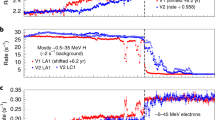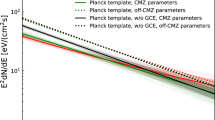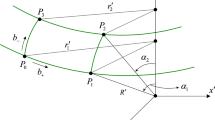Abstract
IN a recent communication, S. Chapman1 has calculated, on the basis of the theory of proportionality between magnetic moment and angular momentum developed recently by P. M. S. Blackett2, that the ratio MM/ME between the magnetic dipole moment of the moon and that of the earth is 1/38,400. It may be readily shown that if this result is correct the magnetic field of the moon can only affect particles of primary cosmic radiation of very small energy, which are able to reach the earth only in the immediate vicinity of the geomagnetic poles. In fact, we have3 which on replacing MM/ME by Chapman‘s value, taking for the ratio DM/RE (DM, distance from the earth to the moon; RE, radius of the earth) its known value, and using for rM the limiting value rM = 0·414, gives rE = 0·05 millistörmers, or approximately 0·1 MeV. (1 MeV. = 106 eV.) if the primary particles are protons, 0·3 MeV. if electrons.
This is a preview of subscription content, access via your institution
Access options
Subscribe to this journal
Receive 51 print issues and online access
$199.00 per year
only $3.90 per issue
Buy this article
- Purchase on Springer Link
- Instant access to full article PDF
Prices may be subject to local taxes which are calculated during checkout
Similar content being viewed by others
References
Nature, 160, 395 (1947).
Nature, 159, 658 (1947).
Vallarta, M. S., Nature, 139, 839 (1937).
Vallarta, M. S., and Godart, O., Rev. Mod. Phys., 11, 180 (1939).
Author information
Authors and Affiliations
Rights and permissions
About this article
Cite this article
VALLARTA, M. Cosmic Rays and the Magnetic Field of the Moon. Nature 161, 646–647 (1948). https://doi.org/10.1038/161646a0
Issue Date:
DOI: https://doi.org/10.1038/161646a0
Comments
By submitting a comment you agree to abide by our Terms and Community Guidelines. If you find something abusive or that does not comply with our terms or guidelines please flag it as inappropriate.



